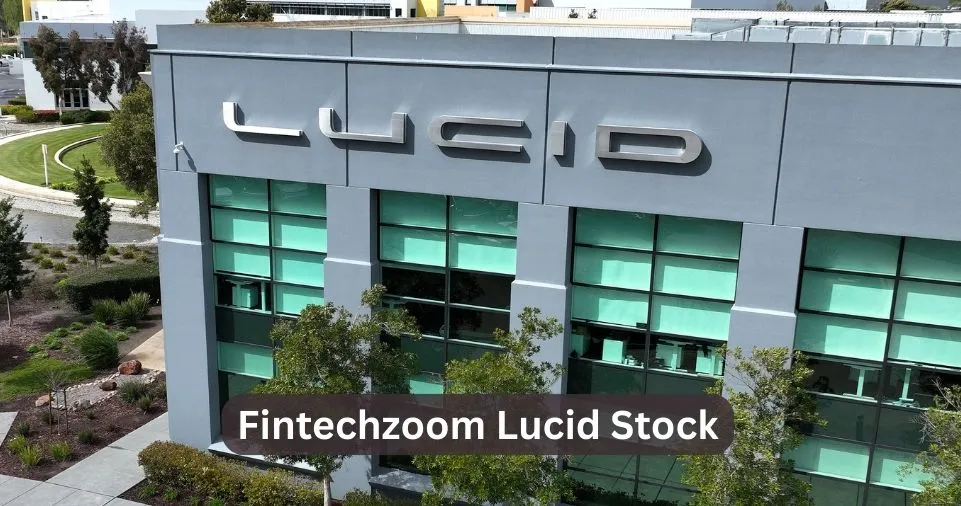Lucid Group, Inc. (LCID), known for its innovative luxury electric vehicles (EVs), has garnered significant attention in the electric car industry.
The global shift towards sustainability and the rising demand for electric vehicles have positioned Lucid as a key player.
Competing with established EV giants like Tesla, Lucid is focused on delivering cutting-edge technology, expanding production, and scaling its business.
Today, at FintechZoom Blog, we will delve into the performance of Lucid stock as analyzed by FintechZoom, offering insights into its market trends, future growth potential, and the challenges ahead.
What is Lucid Group, Inc.?
Lucid Group, Inc., previously known as Atieva, was founded in 2007. Initially, the company focused on developing batteries and powertrains for other manufacturers.
However, in 2016, Lucid shifted its focus to building its own electric vehicles, rebranding as Lucid Motors.
The company made headlines with the introduction of its flagship vehicle, the Lucid Air, a luxury sedan praised for its advanced technology, superior performance, and sleek design.
Lucid went public through a Special Purpose Acquisition Company (SPAC) merger with Churchill Capital Corp IV in 2021.
This move catapulted the company into the public eye, significantly boosting its stock value. The merger was seen as a statement of Lucid’s ambition to become a significant player in the EV market.
Since then, Lucid has been working to increase production capabilities and expand its market share.
Key Factors Affecting Lucid Stock
Several factors have played a role in shaping the performance of Lucid’s stock, both positively and negatively.
Understanding these key elements is crucial for investors looking to assess the stock’s potential.
Production and Delivery Milestones
One of the most significant aspects affecting Lucid’s stock is its ability to meet production and delivery targets.
Like any new entrant in the automotive industry, Lucid faces challenges ramping up production to meet growing demand.
Investors closely watch Lucid’s progress in this area, as missing these targets can lead to stock volatility.
For instance, Lucid faced production delays in 2023, which negatively impacted its stock price. However, meeting or exceeding these milestones could restore investor confidence and lead to positive stock movement.
| Pros | Cons |
|---|---|
| Timely production and delivery could strengthen investor confidence. | Failure to meet production goals could lead to significant stock price drops. |
| Expanding manufacturing capabilities increases long-term growth potential. | Supply chain issues and global market volatility could impact future production. |
Technological Innovation
Lucid is renowned for its technological innovation, particularly in battery efficiency and vehicle range.
The Lucid Air model has been recognized for setting new standards in terms of battery range, which is a significant advantage over its competitors.
As the EV market grows, maintaining leadership in technology will be vital to Lucid’s success.
| Pros | Cons |
|---|---|
| Advanced battery technology and superior vehicle range enhance product competitiveness. | Competitors are quickly advancing, which may challenge Lucid’s technological edge. |
| Technological leadership positions Lucid favorably in the luxury EV market. | Maintaining technological leadership requires continuous, costly research and development. |
Market Expansion
Lucid is focused on expanding into new markets, especially in regions such as Europe, North America, and the Middle East.
The company’s success in penetrating these markets depends on several factors, including local regulations, consumer demand, and Lucid’s ability to establish a strong brand presence.
For example, Lucid has received significant backing from Saudi Arabia’s Public Investment Fund (PIF), which is aiding the company’s expansion into Middle Eastern markets.
Additionally, Lucid’s plans to increase production capacity at its Arizona plant and enter European markets are critical growth factors.
| Pros | Cons |
|---|---|
| Expansion into international markets can increase revenue and customer base. | Expansion brings higher operational costs and potential regulatory hurdles in new markets. |
| Strategic partnerships, such as with Saudi Arabia’s PIF, provide financial stability and support. | New competition in international markets may erode Lucid’s market share. |
Competition in the EV Market
The EV market is increasingly crowded, with established players like Tesla and new entrants like Rivian.
Traditional car manufacturers such as Ford and General Motors are also ramping up their EV efforts.
Lucid’s ability to differentiate itself in this competitive landscape will be critical to its long-term success.
| Pros | Cons |
|---|---|
| Lucid’s focus on luxury vehicles and advanced technology provides a niche market. | Intense competition from both new entrants and traditional automakers could limit Lucid’s market share. |
| The company can capitalize on the growing demand for sustainable, high-performance EVs. | Competitors like Tesla already have well-established production and supply chains, making it harder for Lucid to catch up. |
Financial Performance
Lucid’s financial health is another important consideration for investors. Like many new companies, Lucid is not yet profitable.
The company reported significant losses in 2023, including a net loss of $630 million.
Investors will closely watch Lucid’s ability to manage its costs, ramp up production, and eventually achieve profitability.
| Pros | Cons |
|---|---|
| If Lucid can manage costs effectively and increase revenue, the company has a clear path to profitability. | Continued losses and cash burn may erode investor confidence over time. |
| Financial backing from strategic investors like Saudi Arabia provides financial stability. | Scaling production while managing expenses is a complex challenge for Lucid. |
FintechZoom’s Analysis of Lucid Stock
FintechZoom is a financial platform that provides comprehensive data and analysis on various stocks, including Lucid.
Investors can access detailed financial metrics, expert opinions, and real-time market trends to make informed decisions about Lucid stock.
According to FintechZoom, Lucid’s stock has experienced significant volatility since its public debut.
The company’s stock price saw an initial surge following the SPAC merger, but recent performance has been mixed.
For instance, Lucid’s stock was trading at $2.36 as of April 2024, down from a 52-week high of $8.37.
This volatility is common for companies in the early stages of production, especially in the EV market.
Recent Stock Performance
Lucid’s stock price has been influenced by several key events, including quarterly earnings reports and production updates.
Any deviation from investor expectations in terms of production milestones or financial performance has led to sharp stock price movements.
For example, delays in delivering the Lucid Air negatively impacted the company’s stock in late 2023.
However, FintechZoom notes that long-term growth potential still exists for Lucid, provided the company can overcome its production challenges and continue innovating in the EV space.
Combining FintechZoom and FastBull for Better Analysis
FastBull, a fintech platform that provides real-time market signals and expert commentary, complements FintechZoom’s analysis.
Combining both platforms allows investors to leverage detailed technical and fundamental analysis, real-time signals, and expert insights to make more informed investment decisions.
FastBull’s real-time signals and market trends can alert investors to profitable opportunities, while FintechZoom’s financial metrics provide a comprehensive understanding of Lucid’s stock performance.
Risks and Challenges for Lucid
Lucid faces several risks in its journey to becoming a market leader. These include:
- Production Delays: Failure to meet production milestones, as seen in 2023, can result in stock price drops.
- Market Competition: Lucid faces stiff competition from companies like Tesla, Rivian, and traditional automakers.
- Financial Losses: The company’s significant losses and cash burn are causes for concern among investors.
- Regulatory and Market Changes: Shifting government policies or changes in consumer demand could impact Lucid’s performance.
Future Outlook for Lucid Stock
Despite the challenges, Lucid has ambitious plans for the future.
The company’s upcoming Lucid Gravity SUV is expected to appeal to a broad audience, and its expansion into international markets could lead to increased revenue.
Additionally, Lucid’s focus on innovation and advanced technology will likely keep it competitive in the EV space.
ALSO READ
Conclusion
Lucid Group, Inc. is a promising player in the luxury electric vehicle market, with a strong focus on innovation and international expansion.
However, the company faces significant challenges, including production delays, financial losses, and intense market competition.
Fintech Zoom’s analysis suggests that Lucid’s stock is a high-risk, high-reward investment, and investors should carefully consider their risk tolerance before committing.
For those who believe in Lucid’s long-term potential, the company’s focus on technology and sustainability offers a promising vision for the future of the electric vehicle industry.
By leveraging the insights and analysis provided by platforms like FintechZoom and FastBull, investors can make informed decisions and navigate the volatile EV market with confidence.

